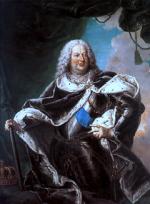Disable ads!
Stanislaus I
Stanisław I Leszczyński (Polish pronunciation: [staˈniswaf lɛʂˈtʂɨɲski]; also known as Stanislaus I, Lithuanian: Stanislovas Leščinskis, French: Stanislas Leszczynski) (20 October 1677 – 23 February 1766) was King of Poland, Grand Duke of Lithuania, Duke of Lorraine and a count of the Holy Roman Empire. Stanisław was born into a powerful magnate family of Greater Poland, and he had the opportunity to travel to western Europe in his youth. In 1702 King Charles XII of Sweden marched into the country as part of a continuing series of conflicts between the powers of northern Europe. Charles forced the Polish nobility to depose Poland’s king, Augustus II the Strong and then placed Stanisław on the throne (1704). The early 18th century was a period of great problems and turmoil for Poland. In 1709 Charles was defeated by the Russians at the Battle of Poltava and withdrew to Sweden, leaving Stanisław without any real and stable support. Augustus II regained the Polish throne, and Stanisław left the country to settle in the French province of Alsace. In 1725 Stanisław’s daughter Marie Leszczyńska married Louis XV of France When Augustus died in 1733, Stanisław sought to regain the Polish throne with the help of French support for his candidacy. After travelling to Warsaw in disguise, he was elected king of Poland by an overwhelming majority of the Diet. However before his coronation, Russia and Austria, fearing Stanisław would unite Poland in the Swedish-French alliance, invaded the country to annul his election. Stanisław was once more deposed, and, under Russian pressure, a small minority in the Diet elected the Saxon elector Frederick Augustus II to the Polish throne as Augustus III. Stanisław retreated to the city of Gdańsk (Danzig) to wait for French assistance, which did not come. Fleeing before the city fell to its Russian besiegers, he then journeyed to Königsberg in Prussia, where he directed guerrilla warfare against the new king and his Russian supporters. The Peace of Vienna in 1738 recognised Augustus III as king of Poland but allowed Stanisław to keep his royal titles while granting him the provinces of Lorraine and Bar for life. In Lorraine, Stanisław proved to be a good administrator and promoted economic development. His court at Lunéville became famous as a cultural centre, and he founded an academy of science at Nancy and a military college. In 1749 he published a book entitled Free Voice to Make Freedom Safe, an outline of his proposed changes in the Polish constitution. Editions of his letters to his daughter Marie, to the kings of Prussia, and to Jacques Hulin, his minister at Versailles, have been published. In Nancy, Place Stanislas (Stanisław Square) was named in his honour.
 Read more on wikipedia.org Read more on wikipedia.org
 All quotes by Stanislaus I All quotes by Stanislaus I
 Edit Edit
|

|
|
|
|
|
Background photo by Giuliana
|